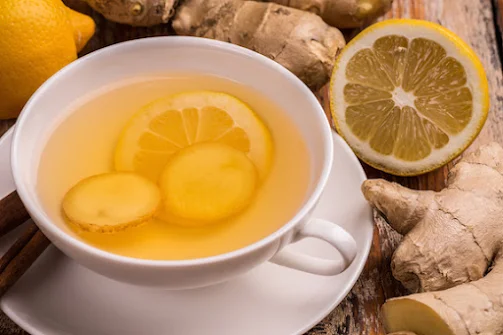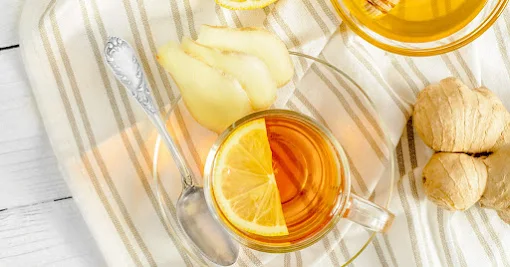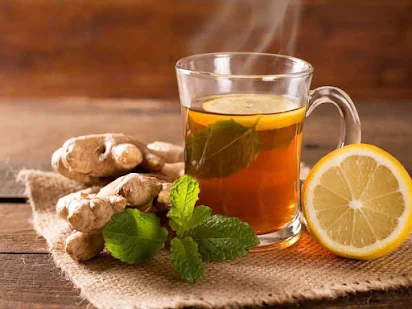How To make Ginger Tea: Benefits
Nutritional Content Of Ginger
Ginger is rich in vitamins such as vitamin C, vitamin B5 and vitamin B6. When it comes to minerals, ginger is a good source of potassium, magnesium and manganese, among others. The root also contains only 80 calories per 100 grams.
The Benefits of Drinking Ginger Tea
As we’re about to go over, there are so many benefits to drinking ginger tea in the colder months. Of course, you could also eat ginger raw. But when you’re feeling cold, drinking something warm is a no-brainer, so you might as well add some beneficial herbs to your drink!One of the special things about ginger tea is that the ginger used can be fresh. This is in contrast to many other herbs for which you must use their dried or ground form to make tea. Furthermore, there are so many different varieties of ginger tea that you can make, depending on what ailment you’re treating or which flavor you prefer.
1. Ginger Tea to Warm the Body
Ginger tea is one of the best home remedies to keep the body warm. It’s considered a “warming herb” by both Ayurveda and traditional Chinese medicine systems. But what is exactly is a warming herb?
What Are Warming Herbs?
In Ayurveda, “warming” herbs are herbs which help increase the amount of Agni, or ‘fire’ in the body. It’s important to mention that the goal is not to add too much fire to the body, but to create a balance when this fire is lacking.Warming herbs are typically considered as such because they help speed up the body’s metabolic rate and help boost circulation. This, in turn, raises the temperature of the body. That’s why ginger is also touted as a great digestive aid (see below).
Other herbs that are considered warming herbs are thyme and turmeric. Interestingly, in addition to helping warm the body, these herbs also share some other benefits in common with ginger, such as cough and cold relief. Of course, some of the ultimate warming herbs would have to be cayenne and other types of chili peppers.
It’s no wonder why in the English language, we often use the terms ‘hot’ and ‘spicy’ interchangeably. While not hot to the touch, spicy herbs like ginger help increase the ‘internal fire’ of the body.
In Chinese medicine, this same hot energy is referred to as yang. It’s important to consume yang herbs to provide optimal balance with the yin, or cold energy of the body. Consuming herbs like ginger, then, can help reduce some of the sluggishness one often feels when faced with extremely cold temperatures.
The concepts of both Ayurveda and Chinese medicine go much, much deeper that what we just covered, but hopefully you get the idea of why ginger tea is considered as one of the best home remedies to keep the body warm.
2. Ginger Tea for Cold and Flu Relief
The winter season is when we’re most susceptible to illnesses like cold and flu. These can be difficult to avoid, especially if stuck in closed quarters with lots of other people, like crowded trains or cramped offices. Drinking ginger tea regularly is a great way to either prevent the onset of these illnesses or help your body overcome them. Ginger is both a natural immune system booster and also has powerful antimicrobial properties.Another reason why ginger tea is so effective for colds, flu and other ailments is that it encourages the body to sweat. Sweating is a natural way for our bodies to expel toxins and pathogens, but it’s rare for people to sweat in cold weather without vigorous exercise.
Ginger’s high vitamin C content and anti-inflammatory properties are further reason why you should consider ginger for cold. Also, by drinking lots of ginger tea every day, you’ll encourage your body to rid itself of even more toxins through frequent urination.
Furthermore, ginger tea is also useful for getting rid of mucus.
3. Drink Ginger Tea for Cough Relief
With colds often comes a cough, though you can certainly experience one without the other. One reason to consider ginger tea for cough is its antihistamine properties, which both treat allergies and help support the body’s respiratory system. Furthermore, ginger can help soothe the throat and suppress coughing thanks to chemical compounds known as phenylalkylketones.When it comes to a wet cough, the type of cough caused by excess mucus buildup, ginger tea is especially helpful. Ginger is a known expectorant, meaning it helps the body rid itself of mucus. (READ MORE ON COUGH HERE)
It’s no wonder, then, why ginger lozenges are so popular these days. These can be great for when you’re on the go. Otherwise, try drinking a couple of daily glasses of ginger tea for cough relief.
Have a cough, cold or joint pain? Ginger tea is an excellent remedy for all
4. Ginger Tea for Digestion
Many people complain of gaining weight in the winter. This can be due to a number of factors. In the cold weather, we’re naturally less active. And our bodies also respond to the season by slowing down its metabolism. Think of bears hibernating all throughout the winter. It’s quite natural for our bodies to perceive the colder months as a time to slow things down and conserve energy.
But in modern times, we’re still faced with the same jobs and daily obligations as we are in the warmer months. We can’t just sit holed up in a cave or cabin like our ancient ancestors might’ve. That’s why it’s especially important to choose the right food and drink to keep our bodies healthy and our digestive systems running smoothly. Yet again, ginger tea comes to the rescue as the perfect wintertime digestive aid.
Above, we went over the Ayurvedic concept of how warming herbs help stimulate the metabolic processes of the body. This is one major reason why ginger is great for digestion in the winter – it helps speed up the digestive system which has otherwise been slowed down.
Ginger is also rich in certain oils which help ease intestinal cramping and release tension in the GI tract. Furthermore, ginger’s anti-inflammatory properties can help ease inflammation in the gut.
Winter is a time when we have some of the strongest cravings for heavy foods. Don’t feel too guilty about indulging from time to time, but be sure to drink a nice hot cup of ginger tea afterward for smoother digestion.
5. Ginger Tea for Joint Pain
Those who suffer from chronic joint pain and arthritis often dread the cold weather. But joint pain during the colder months, especially in the knees, ankles or hips, is not all that uncommon in otherwise healthy people. Furthermore, runners and other types of athletes know all too well that the colder weather can make the body especially injury-prone.
There doesn’t seem to be much conclusive evidence as to exactly why this happens, but it probably has something to do with not enough blood spreading to our joints in the colder months. Another reason is likely the barometric pressure in the atmosphere resulting in an inflammatory response in our joints. This is likely why not just cold, but damp, rainy weather can cause joint pain as well.
Drinking ginger tea is a great idea for joint pain and arthritis because of the herb’s antioxidant and anti-inflammatory properties. And ginger is also known to help boost circulation. To look at the matter in more technical terms, here’s a helpful explanation from the site Natural Arthritis Treatments:
“Ginger is known to suppress prostaglandin (a pro-inflammatory molecule) synthesis by inhibition of the enzyme cylooxygenase (COX-1 & COX-2). It also inhibits 5-lipoxygenase enzyme to suppress leukotriene (involved in inflammatory response) production.”
Some studies have even shown ginger to be as effective as echinacea for treating joint pain. Whether you’re an athlete or someone who regularly experiences arthritis, you can’t go wrong with a few daily cups of ginger tea in the winter.
How to Make Ginger Tea
As mentioned above, ginger is one of the few herbs that can be used for tea in either its fresh or dry form. And one of the great things about ginger is that it’s easily available for purchase at the supermarket all year round.To make ginger tea, simply cut off around 2.5cm of ginger root and peel off the skin. Then take a knife and slice it into several smaller pieces (you can also grate the ginger if you prefer). After that, place the ginger and about 2 cups of water into a saucepan. Heat up the water, bringing it to a boil, and then lower the temperature slightly. You’ll want to let it simmer for around 10 to 15 minutes, after which the color should change. Either keep the ginger in there as is, or use a strainer.
And there you have it! Fresh, homemade ginger tea. But most people like to combine ginger with added flavoring or other herbs for even additional benefits. Let’s take a look at some different variations of ginger tea you can try.To make the most basic ginger tea, this is all you really need
Ginger Tea with Raw Honey
Ginger Tea with Rosemary
To even better protect yourself from cold or flu, you may want to consider adding in another anti-inflammatory herb like rosemary. To do so, simply add in around a teaspoon of dried rosemary with the ginger and water when following the steps outlined above.
Ginger Tea with Lemon
Lemon, along with honey, is among the most common ingredients people add to ginger tea. Not only does it help reduce some of the bitterness, but it adds a powerful vitamin C and antioxidant boost to your drink. Simply add as much or as little lemon juice as you like. Either squeeze the juice right into the tea, or add a slice of lemon into your cup or tea strainer.
Ginger Tea with Turmeric
Turmeric is another fantastic antioxidant warming herb that works well with ginger. The two together make for a great digestive aid. To make turmeric tea, you should also try adding in some black pepper, which increases turmeric’s bioavailability.
To make the tea, follow the directions above, but add in 1 teaspoon of grated turmeric together with the ginger. Bring the water to a boil and let everything steep for 10-15 minutes. Afterwards, add in a teaspoon of grated black pepper, along with however much lemon and honey you desire.
Fresh vs. Powdered Ginger
Generally speaking, whether we’re discussing herbs or vegetables, fresh and raw is always best. However, in comparison with other herbs, ginger seems to maintain many of its nutritional benefits in the powdering process. You may want to do more research on the matter, but generally speaking, use fresh if you have it. If all you have is powdered ginger, you should still be fine.
Ginger Tea Bags
When fresh ginger is so easy to buy, and ginger tea is so easy to make, there’s little reason to choose tea bags over the fresh root. That’s not to say that ginger tea bags are completely devoid of any benefits, but it’s likely that they won’t be as healthy. Of course, a lot also comes down to the quality of the herb and how it’s all processed.
Potential Ginger Side Effects
There aren’t many side effects associated with ginger. In rare cases, a person may suffer an allergic reaction, in which case you should call for help immediately. Other minor problems include ginger potentially lowering blood sugar too much or causing diarrhea.
If you’re already taking medication for blood pressure, you may want to ask your doctor before drinking ginger tea. In regards to combining ginger tea and turmeric, ask your doctor first if you have experience with kidney or gallstones.













Thanks for the education. I will try them